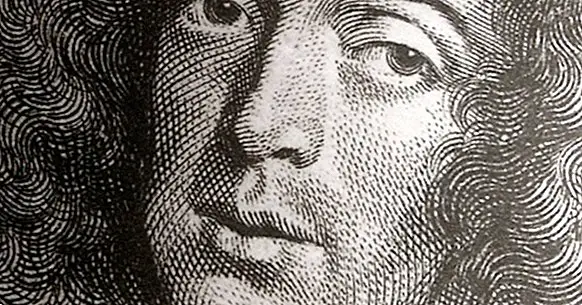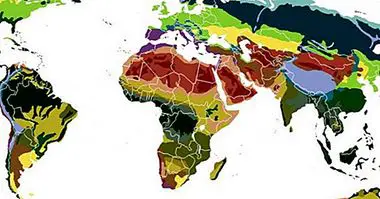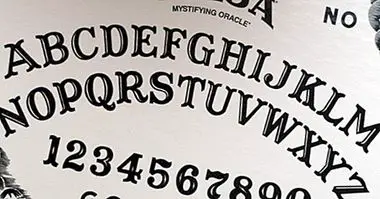How was Spinoza's God and why did Einstein believe in him?
What are we? Why are we here? Does existence itself make sense? How, where and when did the universe originate? These and other questions have aroused the curiosity of the human being since antiquity, who has tried to offer different types of explanation, such as those from religion and science.
The philosopher Baruch Spinoza, for example, created a philosophical theory that served as one of the religious references that have most influenced Western thought since the seventeenth century. In this article we will see how the God of Spinoza was and in what way this thinker lived spirituality.
- Related article: "How are Psychology and Philosophy alike?"
The scientific and the religious
Science and religion Both concepts have been confronted continuously throughout history. One of the issues that have hit the most is the existence of God or different gods that have hypothetically created and regulate nature and existence in general.
Many scientists have considered that belief in a higher entity supposes an unrealistic way of explaining reality . However, this does not imply that scientists can not have their own religious beliefs.
Some great figures of history have even maintained the existence of God, but not as a personal entity that exists and outside the world. This is the case of the renowned philosopher Baruch de Spinoza and his conception of God, who have subsequently been followed by renowned scientists such as Albert Einstein.
The God of Spinoza
Baruch de Spinoza was born in Amsterdam in 1632 , and has been considered as one of the three major rationalist philosophers of the seventeenth century. Their reflections supposed a deep critic to the classic and orthodox vision of the religion, thing that ended up generating its excomunión on the part of its community and its exile, as well as the prohibition and censorship of its writings.
His vision of the world and of faith comes very close to pantheism, that is, the idea that the sacred is all of nature itself.
The reality according to this thinker
The ideas defended by Spinoza were based on the idea that the reality is formed by a single substance , unlike René Descartes, who defended the existence of res cogitans and res extensa. And this substance is nothing other than God, infinite entity and with multiple properties and dimensions of which we can only know a part.
In this way, thought and matter are only expressed dimensions of that substance or modes, and everything that surrounds us, including ourselves, they are parts that conform the divine in the same way . Spinoza believed that the soul is not something exclusive to the human mind, but that it impregnates everything: stones, trees, landscapes, etc.
Thus, from the point of view of this philosopher what we usually attribute to the extracorporal and the divine is the same thing as the material; it is not part of some parallel logics.
Spinoza and his concept of divinity
God is conceptualized not as a personal and personified entity that directs existence externally to it, but as the set of all that exists, expressed both in extension and in thought. In other words, it is considered that God is the reality itself , which is expressed through nature. This would be one of the particular ways in which God expresses himself.
The God of Spinoza would not give a purpose to the world, but this is a part of it. It is considered nature naturante, that is to say, what is and gives origin to different ways or natural natures, such as thought or matter. In short, for Spinoza God is everything and outside of him there is nothing.
- Related article: "Types of religion (and their differences of beliefs and ideas)"
Man and moral
This thought leads this thinker to say that God it does not need to be worshiped nor does it establish a moral system , being this a product of man. There are no bad or good acts in themselves, these concepts being mere elaborations.
Spinoza's conception of man is deterministic: does not consider the existence of free will as such , being all part of the same substance and there is nothing outside it. Thus, for him, freedom is based on reason and the understanding of reality.
Spinoza also considered that there is no mind-body dualism , but it was the same indivisible element. Neither did he consider the idea of the transcendence in which soul and body are separated, and what is lived in life is important.
- Maybe you're interested: "Dualism in Psychology"
Einstein and his beliefs
Spinoza's beliefs earned him the disapproval of his people, excommunication and censorship.However, his ideas and works remained and were accepted and appreciated by a large number of people throughout history. One of them was one of the most valued scientists of all time, Albert Einstein .
The father of the theory of relativity had religious interests in childhood, although later these interests would be modified throughout his life. Despite the apparent conflict between science and faith, in some interviews Einstein would manifest his difficulty in answering the question of whether he believed in the existence of God. While he did not share the idea of a personal God, he said that he considered the human mind is not able to understand the totality of the universe or how it is organized , despite being able to perceive the existence of a certain order and harmony.
Although he has often been classified as a convinced atheist, the spirituality of Albert Einstein he was closer to a pantheistic agnosticism . In fact, I would criticize fanaticisms on the part of both believers and atheists. The winner of the Nobel Prize in Physics would also reflect that his position and religious beliefs approached Spinoza's vision of God, as something that does not direct and punish us but is simply part of everything and manifests itself through this whole. For him, the laws of nature existed and provided a certain order in chaos, manifesting in harmony the divinity.
He also believed that science and religion are not necessarily confronted, since both pursue the search and understanding of reality. In addition, both attempts to explain the world mutually stimulate each other.
Bibliographic references:
- Einstein, A. (1954). Ideas and opinions Bonanza Books.
- Hermanns, W. (1983). Einstein and the Poet: In Search of the Cosmic Man. Brookline Village, MA: Branden Press.
- Spinoza, B. (2000). Ethical demonstrated according to the geometric order. Madrid: Trotta.



















